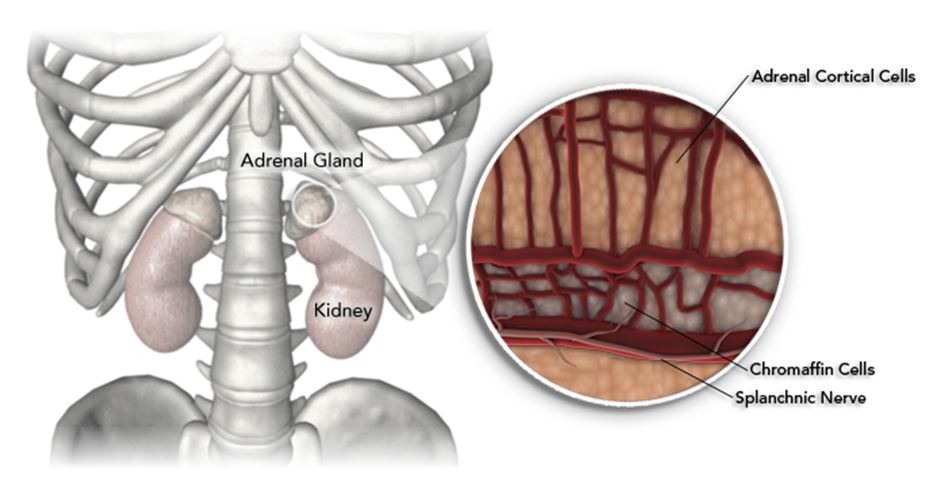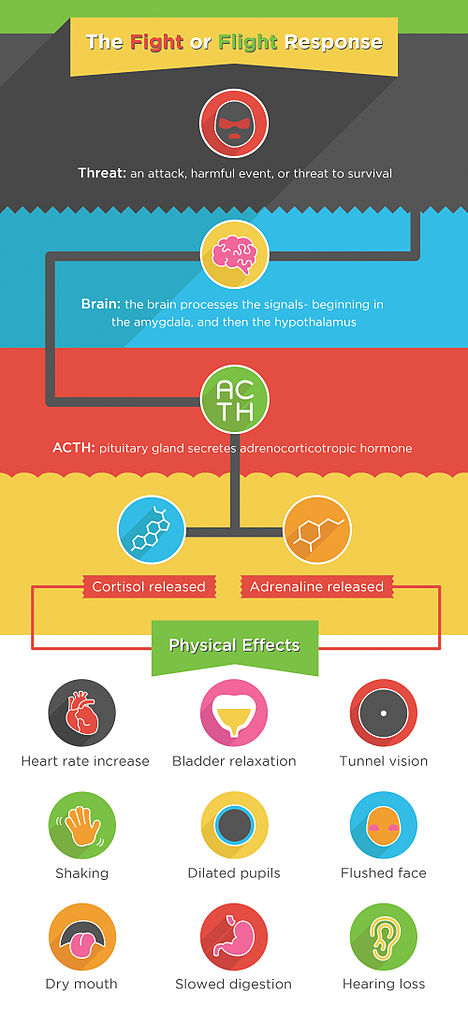The Body and the Fight or Flight Response
“Fight or flight” is the body’s hormonal and chemical response to a perceived physical or mental threat. Hormones released from the amygdala in the brain send a message to the hypothalamus to secrete Adrenocorticotropic hormone (ACTH) which in turn stimulates the sympathetic nervous system to produce the stress hormones: cortisol, epinephrine and norepinephrine.
These hormones are produced in the adrenal glands and released into the blood stream where they bind to receptors on many different organs preparing the body for extreme action in order to deal with the stressor. Stress hormones increase heart rate, blood pressure, breathing rate and blood sugar providing energy to the major muscles of the body to fight or run away. Stress hormones suppress digestion and the immune system, reducing body functions that could be in the way of an extreme physical response.
Stress, Anxiety and The Fight or Flight Response
The fight or flight response is an archaic adaptive survival mechanism put in place by nature to face a physical danger successfully. It ramps up the body strength temporary, to face and resolve a dangerous situation. Once the danger has disappeared all body functions return back to normal. However, in our modern world many individuals experience the fight or flight response on a continuous and long-term basis as a result of physiological, mental or emotional stress.
Worrying, rumination or negative ideation happening in anxiety and chronic stress, causes a continuous secretion of stress hormones. This continuous production of cortisol has numerous detrimental effects on the body, the brain and the adrenal glands.
About the Graphic: Author – Jvnkfood, Creative Common License. Original file.
The Role of Cortisol In the Body
The effects of cortisol on the body are multiple. Cortisol increases blood sugar, blood pressure and the breakdown of muscle and fats. Cortisol can weaken the activity of the immune system. Cortisol decreases calcium absorption in the gut and suppresses the hormones Adrenocorticotropic Hormone (ACTH), Luteinizing Hormone (LH), The Follicle Stimulating Hormone (FSH), Thyroid-Stimulating Hormone (TSH), Growth Hormone (GH). In addition to these actions, cortisol has an effect on our sleep cycles. Cortisol enables us to feel awake and energized in the morning, and relaxed and calm before bed. This action is due to cortisol levels fluctuating during the day. Increased amounts in the morning, wakes us up and lower amounts at night allows us to go to sleep (circadian rhythms). Chronic stress and anxiety put an increased demand on the adrenals to secrete cortisol. Cortisol levels get abnormally high but eventually, the adrenals cannot maintain the increased demand for cortisol, and fail. The result is that cortisol levels are now low and we end up with a condition called adrenal fatigue.
Adrenal Fatigue
The Three Stages of Adrenal Fatigue
Stage 1: Elevated Cortisol Levels: Tired and Wired
Individuals report being unable to fall asleep at night, they have difficulties dealing with common stressors at work or at home, and are constantly fighting colds and other illnesses.
Stage 2: Cortisol Levels Continue to Be High: Resistance
The body’s stores of Vitamin C and B5 which are necessary for the production of cortisol begin to decline. This stage is characterized by low blood pressure, low energy, fatigue at the end of the day, anxiety, insomnia, irritability, moon face and abdominal obesity.
Stage 3: Decline of Cortisol Production: Exhaustion
Insomnia, depression, difficulty taking care of oneself, increased risk of osteoporosis and weakened immune system. Suppression of the thyroid gland results in weight gain, feeling cold and generally sluggish. If proper measures are not taken to replenish and repair the adrenal gland, there is a risk of entering into a fourth stage known as Adrenal Failure. Adrenal failure presents a risk of cardiovascular collapse and even death.
Adrenal Fatigue, Inflammation and Gut Dysbiosis
Prolonged stress decreases tissue sensitivity to cortisol, making it less effective at regulating the immune system. As a result, our bodies have diffuse and widespread inflammation. Inflammation has far reaching effects on the body. Gut dysbiosis, or microbial imbalance, is perhaps the most common. Our gastrointestinal tract is a delicate balance of flora between bacteria and yeast primarily. When functioning normally, our gut helps us to absorb vitamins, minerals and other nutrients from our food and support our immune system to fight infections.
Most recently it was discovered that a healthy gut leads to a healthy brain via the gut-brain axis. A 2011 study showed that probiotics, used to balance the microflora of the gut, were helpful in the treatment of anxiety and depression (Messaoudi, 2011).
Chronic inflammation damages the sensitive gut lining leading to gut dysbiosis or more seriously a condition known as Gut Hyper-Permeability Syndrome or “Leaky Gut”. Leaky gut is the result of chronic inflammation damaging the gut lining and allowing food particles to escape into the blood stream undigested. Once in the blood stream, the immune system identifies the food particles as invaders, or antigens, and mounts an immune response. Over time, these immune molecules begin to pool in areas like our skin and joints, which can become painful and achy. In addition, with damage to the gut lining our bodies become malnourished and we develop food sensitivities and difficulties with digestion.
There are many ways to promote a healthy gut flora, digestion and immune function. It begins with lowering our stress levels and healing our gut.
Stress Management
Stress management is the art and science of reducing stress to healthy levels. Healthy stress is a temporary disruption of internal homeostasis or internal balance; when the stressor is dealt with, stress hormones return to base line and the physical symptoms disappear. However, when stress becomes chronic, the body systems do not have a chance to return to normal and the prolong effect of stress hormones can be destructive and lead to a multitude of illnesses such as high blood pressure, addiction, dysbiosis, adrenal fatigue, anxiety disorders, eating disorders and depression.
References:
1. Michaël Messaoudi et al., Beneficial psychological effects of a probiotic formulation (Lactobacillus helveticus R0052 and Bifidobacterium longum R0175) in healthy human volunteers. Gut Microbes 2:4, 256-261; July/August 2011; © 2011 Landes Bioscience









